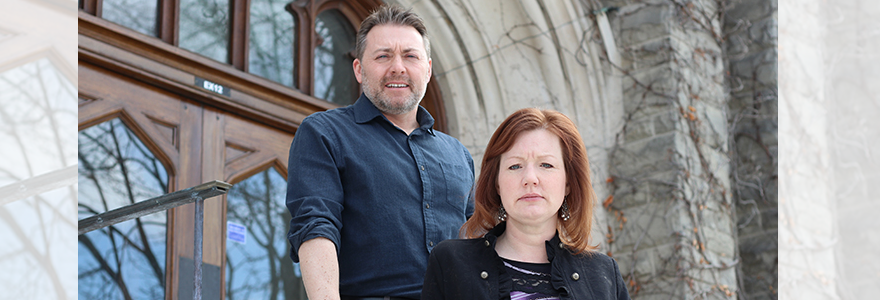News and Updates
Contact
Faculty of Social Science
Social Science Centre
Room 9438
Western University
T. 519-661-2053
F. 519-661-3868
E. social-science@uwo.ca
Michael Dove and Michelle Hamilton receive Award for Excellence in Collaborative Teaching
March 15, 2018
Story by Rob Rombouts/Photo from Western News
Friends for more than two decades, colleagues for one decade, Michelle Hamilton and Mike Dove have been recognized for their commitment to collaboration.
Hamilton and Dove, both professors in the Department of History, are the recipients of the 2018 Vice-Provost (Academic Programs) Award for Excellence in Collaborative Teaching. This is the second year in a row with winners coming from the Faculty of Social Science. (The 2017 award recognized Andrew Walsh and Ian Colquhoun, Associate Professors in the Department of Anthropology, for their work with the Université d’Antsiranana in Madagascar.)
Hamilton and Dove co-administer the Public History program at Western. The M.A. in Public History was established more than 30 years ago. Since 2008, Hamilton and Dove have redesigned the program, taught the core courses and jointly led and administered the program.
For Hamilton and Dove, collaboration takes many forms: co-administering the program, partnerships with community members, and teaching their students how to effectively collaborate.
“We’ve been friends since 1996,” said Hamilton. “That helps because we trust each other.“
Upon taking on the administration of the program, the pair worked to extend the community connections, including increasing the number of community-linked partnerships, creating relationships with more partners, and giving students an option to act as Research Assistants for a community partner, in lieu of a teaching assistant position.
“We really extended the range for students, which has led to more collaboration and partnerships,” said Hamilton. “It has led to wider exposure for what the program does in the community.”
They play a critical role in developing and maintaining community partnerships that, since 2006, have allowed students to work with more than 100 organizations across Canada, including Museum London, Banting House National Historic Site, the Royal Canadian Regiment Museum, the Canadian Museum of Immigration at Pier 21, and Parks Canada.
Joel Ralph graduated from the program in 2006 and is the Director of Programs at Canada’s History. “I cannot think of two other historians in Canada who have dedicated more time and effort to creating unique collaborations between themselves, their students, and the larger history community,” Ralph said.
Dove said much of their work is about raising the profile of the study of history itself. “People often ask what historians do. Our work is about raising historical consciousness,” said Dove. “It’s a privilege to be able to work with students to follow their passion and equip them with skills to succeed.”
“Half of the work we do is relationship building,” said Hamilton. And these efforts have paid off. “Our experience with the community partners means that they are more likely to take our interns and graduates for projects. They trust the training.”
Through their classroom lessons and community projects, Hamilton and Dove work to teach students the importance of teamwork, and of meeting the needs and requirements of others.
The students are “not done with their work until it is acceptable, to their supervisor, their community partners and their colleagues,” said Dove.
Hamilton and Dove feel this training better prepares students to apply their training in the job market. “After our program, students have communication skills. They can share, compromise, and collaborate,” said Dove.
“Our students feel more polished and professional,” said Hamilton. “We try to transform them from undergraduate students so they see themselves as public historians by the time they leave.”
“Consciously learning how to connect and collaborate with others, as opposed to just being forced into group work, was by far the biggest take for me,” said Jessica Knapp, Online Engagement Coordinator for Canada’s History. Knapp completed her MA in Public History in 2014. “It is clear that this process was so influential because Michelle and Mike practice this pedagogy themselves as they jointly administer, teach, and manage the MA in Public History.”
Receiving the award is an “acknowledgment and validation,” said Dove. “I see it as a commitment that collaborative teaching and working with the community is valuable and will continue to be supported.”
Established in 2017, the Vice-Provost (Academic Programs) Award for Excellence in Collaborative Teaching recognizes instructors whose exemplary collaborations in university teaching enhance student learning.
The 2017 award recognized Andrew Walsh and Ian Colquhoun, Associate Professors in the Department of Anthropology, for their work with the Université d’Antsiranana in Madagascar

